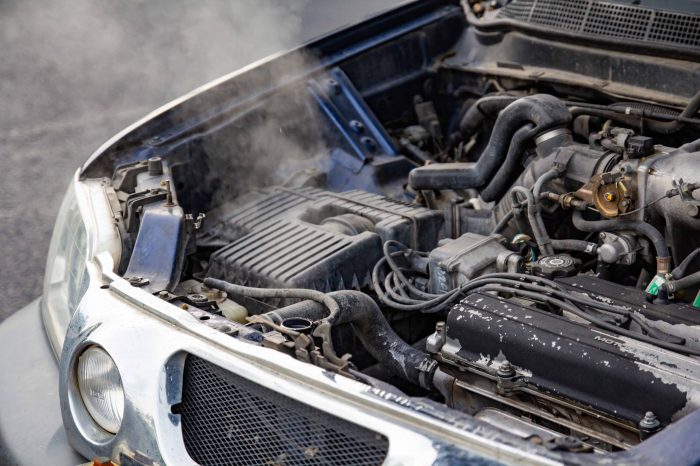Top reasons for car engine overheating sets the stage for this enthralling narrative, offering readers a glimpse into a story that is rich in detail with informal but serious style and brimming with originality from the outset.
When it comes to car engine overheating, understanding the root causes is crucial for maintaining your vehicle’s health and performance. Let’s dive into the top reasons behind this common issue and explore how each factor contributes to the problem.
Common Causes of Car Engine Overheating
Car engine overheating can be caused by a variety of factors, ranging from simple issues to more complex problems. Understanding these common causes can help prevent serious damage to your vehicle.
Low Coolant Levels
One of the most common reasons for engine overheating is low coolant levels. Coolant is responsible for regulating the temperature of the engine and preventing it from overheating. When coolant levels are low, there is not enough fluid to properly cool the engine, leading to overheating.
When it comes to protecting your car, having the best car insurance coverage options is essential. From liability to comprehensive coverage, this guide will help you understand your options and choose the right insurance for your needs. Don’t hit the road without the right coverage!
Thermostat Malfunction
A malfunctioning thermostat can also lead to engine overheating. The thermostat regulates the flow of coolant through the engine. If it gets stuck in the closed position, coolant cannot flow properly, causing the engine to overheat.
Radiator Issues
Issues with the radiator, such as clogs or leaks, can prevent the proper circulation of coolant and lead to engine overheating. A damaged radiator cannot effectively dissipate heat, resulting in the engine running hot.
Water Pump Failure
The water pump is responsible for circulating coolant throughout the engine. If the water pump fails, coolant cannot flow correctly, causing the engine to overheat. Common signs of water pump failure include coolant leaks and engine overheating.
Hey there! Are you looking for a comprehensive car tire pressure maintenance guide ? Keeping your tires properly inflated is crucial for your safety on the road. Check out this guide to learn all you need to know about maintaining the right tire pressure for your vehicle.
Importance of Proper Cooling System Maintenance
Regular maintenance of your vehicle’s cooling system is crucial in preventing engine overheating. Neglecting this maintenance can lead to serious issues such as engine damage, breakdowns, and expensive repairs. Here are some tips on how to effectively maintain your cooling system to avoid overheating problems.
Regular Inspections
Perform regular inspections of the cooling system components, including the radiator, hoses, thermostat, and water pump. Look for any signs of leaks, corrosion, or damage that could potentially cause overheating.
Coolant Level Check, Top reasons for car engine overheating
Check the coolant level regularly and top it off if needed. Make sure to use the correct type of coolant recommended by the manufacturer to prevent corrosion and ensure proper cooling system function.
Flush the System
Regularly flush the cooling system to remove any buildup of dirt, debris, or contaminants that could impede the flow of coolant. This will help maintain the system’s efficiency and prevent overheating.
Check the Thermostat
Ensure that the thermostat is functioning correctly to regulate the temperature of the engine. A faulty thermostat can cause the engine to overheat, so it’s important to replace it if necessary.
Monitor Engine Temperature
Keep an eye on the engine temperature gauge while driving to detect any signs of overheating early on. If you notice the temperature rising abnormally, pull over and allow the engine to cool down before continuing.
Professional Maintenance
Consider taking your vehicle to a professional mechanic for regular maintenance of the cooling system. They can perform more in-depth inspections and maintenance procedures to ensure your cooling system is in optimal condition.
Signs and Symptoms of Engine Overheating: Top Reasons For Car Engine Overheating
When your car engine is overheating, there are several signs and symptoms to watch out for that can indicate a problem. Ignoring these warning signs can lead to serious damage to your vehicle.
Common Signs of Engine Overheating
- Steam coming from the engine compartment
- Burning smell from under the hood
- Temperature gauge in the red zone
Driver Symptoms of Engine Overheating
- Loss of power while driving
- Strange noises coming from the engine
- Dashboard warning lights flashing
Warning Lights and Gauges for Engine Overheating
- The temperature gauge moving towards the H (hot) zone
- A red engine temperature warning light on the dashboard
- A coolant temperature warning light flashing
Immediate Steps to Take When Engine Overheats

When your car’s engine starts to overheat, it’s crucial to act quickly to prevent any serious damage. Here are the necessary actions to take if you find yourself in this situation.
Safely Pull Over and Address the Overheating Issue
If you notice your engine overheating, the first step is to safely pull over to the side of the road. Turn off the engine immediately to allow it to cool down. It’s important not to continue driving as this can cause further damage to the engine.
What Not to Do When Dealing with an Overheating Engine
– Do not open the radiator cap while the engine is hot as it can lead to hot coolant spraying out and causing burns.
– Avoid adding cold water to the radiator while the engine is still hot. The sudden change in temperature can crack the engine block.
– Don’t attempt to drive the car if the engine is severely overheating. This can result in complete engine failure.
Conclusion
In conclusion, being aware of the top reasons for car engine overheating empowers you to take proactive steps in preventing potential damage to your vehicle. By addressing these culprits early on and staying vigilant with maintenance, you can keep your engine running smoothly for miles to come.